First the Mortgage Defaults Crisis Now the Credit Card Crash
Companies / Credit Crisis 2009 May 16, 2009 - 05:35 PM GMTBy: Mike_Shedlock
 Credit card defaults are soaring, with double digit rates at Citigroup, Wells Fargo, and American Express.
Credit card defaults are soaring, with double digit rates at Citigroup, Wells Fargo, and American Express.
 Let's take a look starting with Credit Card Defaults Reach Record Highs in April.
Let's take a look starting with Credit Card Defaults Reach Record Highs in April.U.S. credit card defaults rose in April to record highs, with Citigroup and Wells Fargo posting double digit loss rates, as the recession slashed more than 2 million jobs since the beginning of the year.
Citigroup (C) a big issuer of MasterCard cards—reported its annualized charge-off rate rose to 10.21 percent in April from 9.66 percent in March.
Wells Fargo (WFC) ]said its charge-off rate increased to 10.03 percent from 9.68 percent, while JPMorgan Chase (JPM) a big issuer of Visa (V) cards reported its charge-off rate rose to 8.07 percent from 7.13 percent in the previous month.
Discover Financial Services (DFS), the U.S. fourth-largest credit card network, said its default rate rose to 8.26 percent in April from 7.39 percent in March.
Credit card lenders are trying to protect themselves by tightening credit limits, raising standards and closing accounts. They have also been slashing rewards, increasing interest rates and boosting fees to cushion against further losses.American Express Card Defaults Exceed 10%
American Express (AXP) joins the double digit club as noted in American Express US credit card defaults rise.
American Express Co said on Friday that U.S. credit card defaults jumped in April,
as a deep recession slashed hundreds of thousands of jobs in the last month.
In a regulatory filing, the largest U.S. charge card operator by sales volume said its net charge-off rate -- the percentage of debt it does not expect to be repaid -- rose to 10.1 percent in April from 8.80 percent in March.
However, the rate for loans at least 30 days delinquent -- an indicator of future defaults -- fell to 4.9 percent from 5.1 percent.Capital One US card defaults decline in April
Bucking the trend (until one looks at the ugly details) Capital One US card defaults decline in April.
Capital One Financial Corp. said Friday that U.S. credit card defaults fell in April, but the improvement was largely due to a change in the way the company processes bankruptcies, which increased in volume during the month.
In a regulatory filing, the McLean, Va.-based company said the annual net charge-off rate for U.S. credit cards fell to 8.56 percent from 9.33 percent in March. Capital One, which issues MasterCard and Visa credit cards, said the April results reflected a change in the way it processes bankrupts. Its practice had been to charge off customer accounts within 2 to 3 days of receiving a bankruptcy notice. But due to an increase in volume in bankruptcies, the company extended the processing time so that bankrupt accounts are charged off within 30 days.
In international card operations, the charge-off rate rose to 8.91 percent from 8.67 percent in March, while the 30-day delinquency rate rose to 6.43 from 6.25 percent.
In Capital One's auto loan unit, the charge-off rate fell to 3.46 percent from 4.08 percent in the previous month, but the delinquency rate rose to 7.81 percent from 7.52 percent.Capital One Redlining
I expect Capital One to join the double digit club soon. Capital One is sure acting desperate about something as noted in Credit Card Lending Goes Full Cycle and Vanishing Credit Lines for Consumers and Small Businesses.
Last month Credit Card Defaults Hit 20 Year High and it should be no surprise that this month is worse. Next month will be worse and so too will the month after that. As long as we are shedding 500,000 jobs a month how can one expect anything else?
Remember that credit cards are unsecured loans. Card chargeoffs are a direct hit to the bottom line. That bottom line is looking bleak regardless of what nonsense Geithner and Bernanke are spewing about banks being well capitalized.
By Mike "Mish" Shedlock
http://globaleconomicanalysis.blogspot.com
Click Here To Scroll Thru My Recent Post List
Mike Shedlock / Mish is a registered investment advisor representative for SitkaPacific Capital Management . Sitka Pacific is an asset management firm whose goal is strong performance and low volatility, regardless of market direction.
Visit Sitka Pacific's Account Management Page to learn more about wealth management and capital preservation strategies of Sitka Pacific.
I do weekly podcasts every Thursday on HoweStreet and a brief 7 minute segment on Saturday on CKNW AM 980 in Vancouver.
When not writing about stocks or the economy I spends a great deal of time on photography and in the garden. I have over 80 magazine and book cover credits. Some of my Wisconsin and gardening images can be seen at MichaelShedlock.com .
© 2009 Mike Shedlock, All Rights Reserved
Mike Shedlock Archive |
© 2005-2022 http://www.MarketOracle.co.uk - The Market Oracle is a FREE Daily Financial Markets Analysis & Forecasting online publication.



